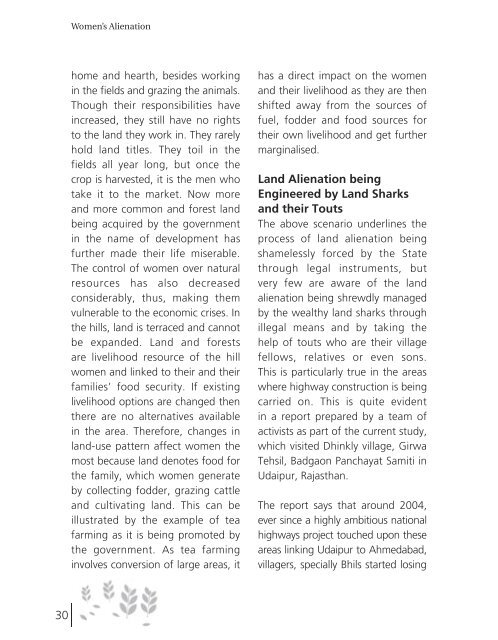om e 's Ali a - Land ss De elo en - Friedrich-Ebert-Stiftung, India Office
om e 's Ali a - Land ss De elo en - Friedrich-Ebert-Stiftung, India Office
om e 's Ali a - Land ss De elo en - Friedrich-Ebert-Stiftung, India Office
Create successful ePaper yourself
Turn your PDF publications into a flip-book with our unique Google optimized e-Paper software.
30<br />
W<strong>om</strong><strong>en</strong>’s <strong>Ali</strong><strong>en</strong>ation<br />
h<strong>om</strong>e and hearth, besides working<br />
in the fields and grazing the animals.<br />
Though their responsibilities have<br />
increased, they still have no rights<br />
to the land they work in. They rarely<br />
hold land titles. They toil in the<br />
fields all year long, but once the<br />
crop is harvested, it is the m<strong>en</strong> who<br />
take it to the market. Now more<br />
and more c<strong>om</strong>mon and forest land<br />
being acquired by the governm<strong>en</strong>t<br />
in the name of dev<strong>elo</strong>pm<strong>en</strong>t has<br />
further made their life miserable.<br />
The control of w<strong>om</strong><strong>en</strong> over natural<br />
resources has also decreased<br />
considerably, thus, making them<br />
vulnerable to the econ<strong>om</strong>ic crises. In<br />
the hills, land is terraced and cannot<br />
be expanded. <strong>Land</strong> and forests<br />
are livelihood resource of the hill<br />
w<strong>om</strong><strong>en</strong> and linked to their and their<br />
families’ food security. If existing<br />
livelihood options are changed th<strong>en</strong><br />
there are no alternatives available<br />
in the area. Therefore, changes in<br />
land-use pattern affect w<strong>om</strong><strong>en</strong> the<br />
most because land d<strong>en</strong>otes food for<br />
the family, which w<strong>om</strong><strong>en</strong> g<strong>en</strong>erate<br />
by collecting fodder, grazing cattle<br />
and cultivating land. This can be<br />
illustrated by the example of tea<br />
farming as it is being pr<strong>om</strong>oted by<br />
the governm<strong>en</strong>t. As tea farming<br />
involves conversion of large areas, it<br />
has a direct impact on the w<strong>om</strong><strong>en</strong><br />
and their livelihood as they are th<strong>en</strong><br />
shifted away fr<strong>om</strong> the sources of<br />
fuel, fodder and food sources for<br />
their own livelihood and get further<br />
marginalised.<br />
<strong>Land</strong> <strong>Ali</strong><strong>en</strong>ation being<br />
Engineered by <strong>Land</strong> Sharks<br />
and their Touts<br />
The above sc<strong>en</strong>ario underlines the<br />
proce<strong>ss</strong> of land ali<strong>en</strong>ation being<br />
shamele<strong>ss</strong>ly forced by the State<br />
through legal instrum<strong>en</strong>ts, but<br />
very few are aware of the land<br />
ali<strong>en</strong>ation being shrewdly managed<br />
by the wealthy land sharks through<br />
illegal means and by taking the<br />
help of touts who are their village<br />
fellows, relatives or ev<strong>en</strong> sons.<br />
This is particularly true in the areas<br />
where highway construction is being<br />
carried on. This is quite evid<strong>en</strong>t<br />
in a report prepared by a team of<br />
activists as part of the curr<strong>en</strong>t study,<br />
which visited Dhinkly village, Girwa<br />
Tehsil, Badgaon Panchayat Samiti in<br />
Udaipur, Rajasthan.<br />
The report says that around 2004,<br />
ever since a highly ambitious national<br />
highways project touched upon these<br />
areas linking Udaipur to Ahmedabad,<br />
villagers, specially Bhils started losing


